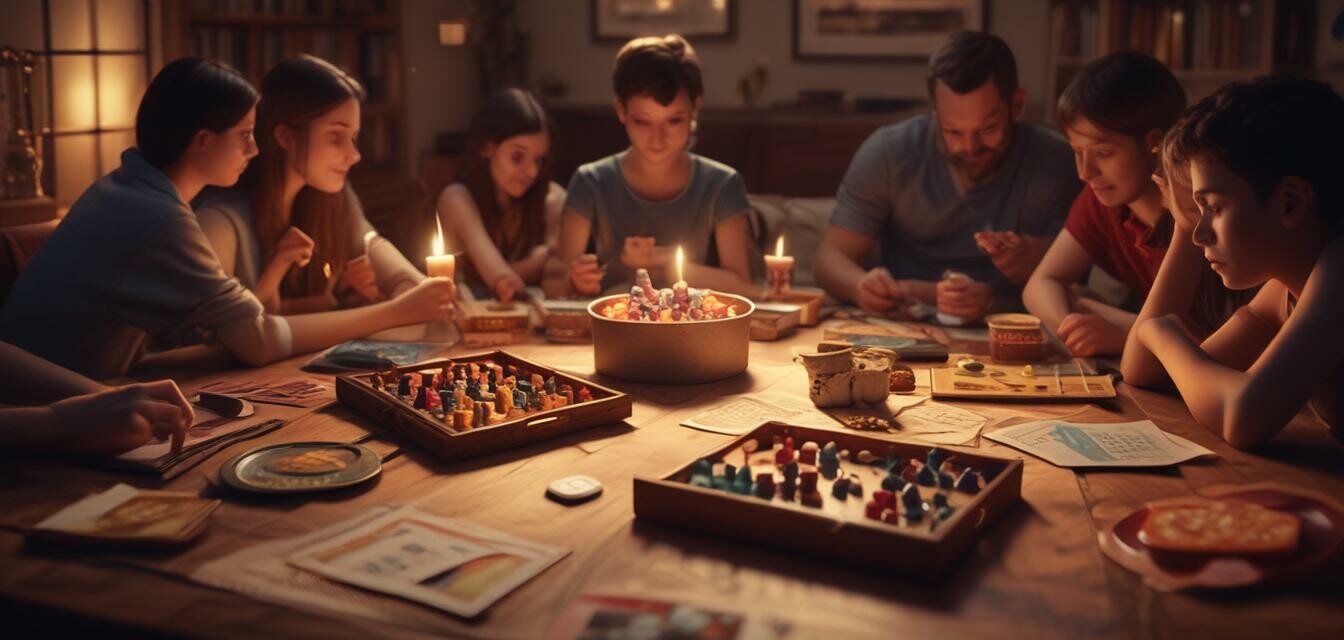
Hosting a Family Educational Game Night
Key Takeaways
- Incorporate a variety of educational games to engage all age groups.
- Set up a comfortable and inviting environment for your game night.
- Encourage teamwork and collaboration among family members.
- Balance screen time with engaging non-gaming activities.
- Prepare snacks and drinks that add to the fun atmosphere.
Are you looking for a fun way to spend time with your family while also enhancing everyone's knowledge? Hosting a family educational game night is an excellent approach to achieving both fun and learning. In this guide, we'll walk you through some tips and ideas to create an unforgettable educational game night that caters to all ages.
Setting Up Your Game Night
Before diving into the games, it's essential to set up your environment. Here are some helpful tips:
- Choose the right location: A living room or family room usually works best for game nights. Make sure there’s enough space for everyone to sit comfortably.
- Create a cozy atmosphere: Use warm lighting and have comfortable seating arrangements to encourage relaxation and engagement.
- Gather the right materials: Have all your educational games ready, including board games, card games, and even digital games that promote learning.
Choosing Educational Games
Select games suitable for a range of ages to ensure everyone has a great time. Here’s a breakdown of different types of educational games you can incorporate:
| Game Type | Age Group | Learning Outcomes |
|---|---|---|
| Board Games | 4+ | Critical thinking, strategy, social skills |
| Card Games | 6+ | Math skills, logic, and memory |
| Trivia Games | 8+ | General knowledge, teamwork |
| Interactive Online Games | 10+ | Technology skills, collaboration |
For specific categories and recommendations on educational games, check out our Educational Games page.
Organizing the Night’s Activities
Once you have your games and setup ready, it's time to plan the night’s activities:
- Game Rotations: Have participants rotate between different games to keep the excitement levels high.
- Team Formation: Pair up family members to encourage teamwork and collaboration.
- Setting Time Limits: Play each game for a pre-defined duration to keep things moving and to cover more games.
Incorporating Breaks
It’s important to incorporate short breaks between games for refreshments and discussions. This allows everyone to recharge and engages family conversation about the games played and lessons learned.
| Break Activity | Description |
|---|---|
| Snack Time | Serve up healthy snacks that fuel everyone’s minds. |
| Discussion Round | Engage in a light discussion about what everyone learned during the games. |
| Stretch Break | Encourage everyone to stand up and engage in a brief stretching session. |
Preparing Snacks and Drinks
No game night is complete without delicious snacks and drinks. Here are some ideas:
- Healthy Snacks: Prepare cut fruits, vegetables, and nut mixes to keep everyone's energy levels high.
- Fun Themed Snacks: Create snacks that align with the educational theme, such as alphabet cookies or number cupcakes.
- Beverage Options: Offer a mix of healthy juices and flavored water to keep everyone hydrated.
Encouraging a Positive Atmosphere
To create a fun and engaging atmosphere, consider the following tips:
- Promote Positivity: Celebrate everyone’s achievements and learning milestones, no matter how small.
- Focus on Teamwork: Emphasize working together, rather than just winning.
- Balance Screen Time: If incorporating digital games, select those that encourage active participation and minimize sedentary behavior.
For ideas on balancing screen time with engaging non-gaming activities, visit our Family Gaming Tips section.
Wrapping Up the Night
As the night comes to an end, gather everyone to discuss their favorite moments and what they learned. This reflection not only reinforces the educational aspect but also creates lasting memories.
Tips for a Successful Educational Game Night
- Keep a flexible schedule; allow time for fun conversations and unexpected moments.
- Be prepared to adapt games if certain ones don't engage the kids as expected.
- Consider using a raffle system where participants can win small prizes for participation or for answering quiz questions correctly.
Pros
- Enhances family bonding through fun and learning.
- Encourages cooperative skills and teamwork among family members.
- Offers a platform for discussing educational topics outside school.
Cons
- Some games might not appeal to all age groups.
- Requires planning and preparation time.
- Potential for competitive tensions to rise during gameplay.
Hosting a family educational game night is an excellent way to merge fun, learning, and quality family time. By incorporating various educational games and creating a positive atmosphere, you can ensure that the experience is rewarding for everyone involved. Happy gaming!